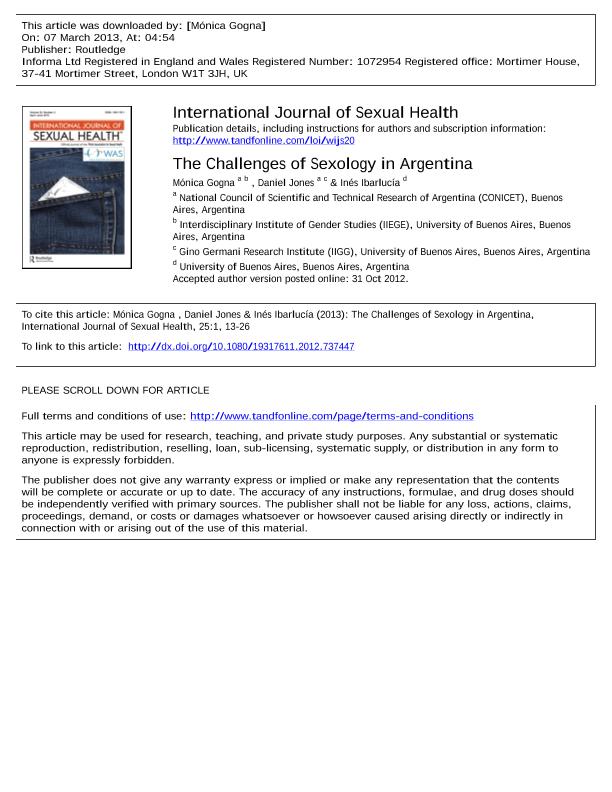Mostrar el registro sencillo del ítem
dc.contributor.author
Gogna, Monica Laura

dc.contributor.author
Jones, Daniel Eduardo

dc.contributor.author
Ibarlucía, Inés

dc.date.available
2017-10-03T15:55:17Z
dc.date.issued
2013-03
dc.identifier.citation
Gogna, Monica Laura; Jones, Daniel Eduardo; Ibarlucía, Inés; The challenges of sexology in Argentina; Taylor & Francis; International Journal of Sexual Health; 25; 1; 3-2013; 13-26
dc.identifier.issn
1931-7611
dc.identifier.uri
http://hdl.handle.net/11336/25739
dc.description.abstract
This article inquires into the origins and present dynamics of sexology in Argentina, with the aim of discussing its prevailing approaches and shedding light on some of the field's tensions and challenges. Findings are based on empirical research that used both secondary sources (i.e., course outlines, conference programs, and affiliation and accreditation rules of professional associations and curriculum vitae of well-known sexologists) and qualitative data gathered in interviews with key actors in the field (sexual therapists, sex educators, and other professionals dealing with sexuality issues who do not acknowledge themselves as sexologists). The text also maps professional organizations and training options, explores potential tensions in the field (i.e., the relation between those providing sexual counseling and sex education), and addresses two main issues: the increasing medicalization of the field stimulated by the Viagra phenomenon and the gender power imbalance between professions (most physicians working as sexologists are male, while most psychologists and psychoanalysts are female). It is our hypothesis that both sexologists’ profile (mainly male physicians) and the nature of the demands they face (their clients are basically middle-class couples or individuals seeking to improve their sexual lives) may explain their lack of familiarity and/or interest regarding the gender perspective and nonhegemonic sexualities. The fact that there has not been an evident generational renovation as well as sexologists’ small amount of interaction with nongovernmental and governmental actors regarding public policies on sexuality-related issues (i.e., decriminalization of abortion, sex education in schools) seem to indicate that the field is facing challenges other than increasing medicalization that threatens the power and prestige of these specialists.
dc.format
application/pdf
dc.language.iso
eng
dc.publisher
Taylor & Francis

dc.rights
info:eu-repo/semantics/openAccess
dc.rights.uri
https://creativecommons.org/licenses/by-nc-sa/2.5/ar/
dc.subject
Sexology
dc.subject
Argentina
dc.subject
Medicalization
dc.subject
Gender Perspective
dc.title
The challenges of sexology in Argentina
dc.type
info:eu-repo/semantics/article
dc.type
info:ar-repo/semantics/artículo
dc.type
info:eu-repo/semantics/publishedVersion
dc.date.updated
2017-10-02T19:11:45Z
dc.journal.volume
25
dc.journal.number
1
dc.journal.pagination
13-26
dc.journal.pais
Reino Unido

dc.journal.ciudad
Londres
dc.description.fil
Fil: Gogna, Monica Laura. Consejo Nacional de Investigaciones Científicas y Técnicas; Argentina. Universidad de Buenos Aires. Facultad de Filosofía y Letras. Instituto Interdisciplinario de Estudios de Género; Argentina
dc.description.fil
Fil: Jones, Daniel Eduardo. Universidad de Buenos Aires. Facultad de Ciencias Sociales. Instituto de Investigaciones "Gino Germani"; Argentina. Consejo Nacional de Investigaciones Científicas y Técnicas; Argentina
dc.description.fil
Fil: Ibarlucía, Inés. Universidad de Buenos Aires. Facultad de Ciencias Sociales. Instituto de Investigaciones "Gino Germani"; Argentina. Consejo Nacional de Investigaciones Científicas y Técnicas; Argentina
dc.journal.title
International Journal of Sexual Health
dc.relation.alternativeid
info:eu-repo/semantics/altIdentifier/doi/http://dx.doi.org/10.1080/19317611.2012.737447
dc.relation.alternativeid
info:eu-repo/semantics/altIdentifier/url/http://www.tandfonline.com/doi/abs/10.1080/19317611.2012.737447
Archivos asociados
